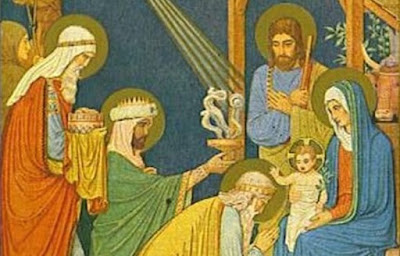The Epiphany of the Lord
Solemnity - January 7th
Today the Church celebrates the Solemnity of the Epiphany. Father Pius Parsch writes of this feast: "The Lord and ruler is coming; kingship is his, and [his wise] government and power." With these words the Church proclaims that today's feast brings to a perfect fulfillment all the purposes of Advent. [The] Epiphany, therefore, marks the liturgical zenith of the Advent-Christmas season.
The Solemnity of the Epiphany is celebrated either on January 6 or, according to the decision of the episcopal conference, on the Sunday between January 2 and January 8. The young Messiah is revealed as the light of the nations. Yet, as the antiphon for the Magnificat at Second Vespers reminds us, three mysteries are encompassed in this solemnity: the adoration of the Christ Child by the Magi, the Baptism of Christ and the wedding feast at Cana. Extra candles and/or lamps may be placed around the sanctuary and in other parts of the church to honor Christ...as the Light of the Gentiles (Ceremonial of Bishops). It is customary to replace the gathered shepherds at the crib with the three Magi and their gifts.
The feast of the Epiphany, which was kept in the East and in certain Western Churches before being celebrated in Rome, seems to have been originally a feast of the Nativity; January 6, for those churches where it was observed, was the equivalent of Christmas (December 25) in the Roman Church. The feast was introduced in Rome during the second half of the sixth century and became the complement and, so to say, the crown of the Christmas festival or Christmastide.
The word Epiphany means manifestation. What the Church celebrates today is the manifestation of our Lord to the whole world; after being made known to the shepherds of Bethlehem He is revealed to the Magi who have come from the East to adore Him. Christian tradition has ever seen in the Magi the first fruits of the Gentiles; they lead in their wake all the peoples of the earth, and consequently, the Epiphany is an affirmation of universal salvation. St. Leo brings out this point admirably in a sermon, read at Matins, in which he shows in the adoration of the Magi the beginnings of the Christian faith, the time when the great mass of the heathen sets off to follow the star which summons it to seek its Lord and Savior.
____________________________________________
Sources:
Ceremonies of the Liturgical Year, Monsignor Peter J. Elliott.
The Church's Year of Grace, Father Pius Parsch.
"The Fifteen Day of Christmas", Catholic Culture.org

Comments